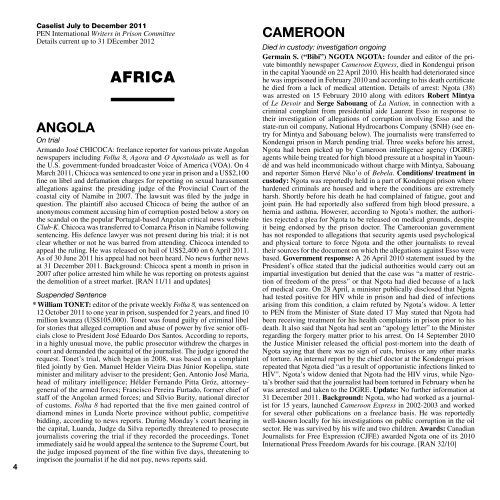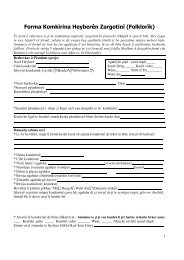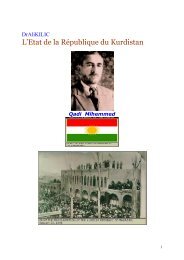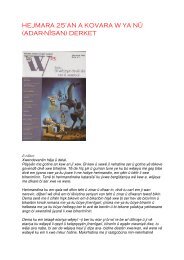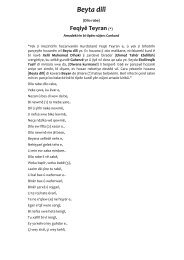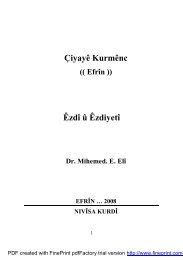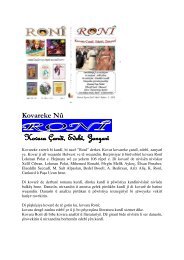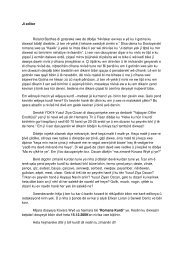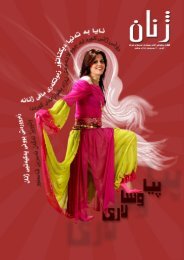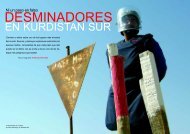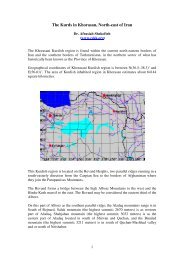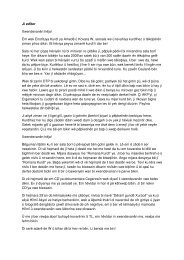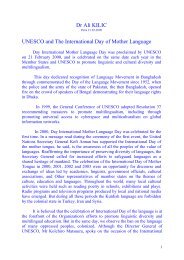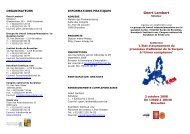Caselist - PEN International
Caselist - PEN International
Caselist - PEN International
Create successful ePaper yourself
Turn your PDF publications into a flip-book with our unique Google optimized e-Paper software.
<strong>Caselist</strong> July to December 2011<strong>PEN</strong> <strong>International</strong> Writers in Prison CommitteeDetails current up to 31 DEcember 2012AFRICAANGOLAOn trialArmando José CHICOCA: freelance reporter for various private Angolannewspapers including Folha 8, Agora and O Apostolado as well as forthe U.S. government-funded broadcaster Voice of America (VOA). On 4March 2011, Chicoca was sentenced to one year in prison and a US$2,100fine on libel and defamation charges for reporting on sexual harassmentallegations against the presiding judge of the Provincial Court of thecoastal city of Namibe in 2007. The lawsuit was filed by the judge inquestion. The plaintiff also accused Chicoca of being the author of ananonymous comment accusing him of corruption posted below a story onthe scandal on the popular Portugal-based Angolan critical news websiteClub-K. Chicoca was transferred to Comarca Prison in Namibe followingsentencing. His defence lawyer was not present during his trial; it is notclear whether or not he was barred from attending. Chicoca intended toappeal the ruling. He was released on bail of US$2,400 on 6 April 2011.As of 30 June 2011 his appeal had not been heard. No news further newsat 31 December 2011. Background: Chicoca spent a month in prison in2007 after police arrested him while he was reporting on protests againstthe demolition of a street market. [RAN 11/11 and updates]Suspended Sentence* William TONET: editor of the private weekly Folha 8, was sentenced on12 October 2011 to one year in prison, suspended for 2 years, and fined 10million kwanza (US$105,000). Tonet was found guilty of criminal libelfor stories that alleged corruption and abuse of power by five senior officialsclose to President José Eduardo Dos Santos. According to reports,in a highly unusual move, the public prosecutor withdrew the charges incourt and demanded the acquittal of the journalist. The judge ignored therequest. Tonet’s trial, which began in 2008, was based on a complaintfiled jointly by Gen. Manuel Helder Vieira Dias Júnior Kopelipa, stateminister and military adviser to the president; Gen. Antonio José Maria,head of military intelligence; Hélder Fernando Pitta Gróz, attorneygeneralof the armed forces; Francisco Pereira Furtado, former chief ofstaff of the Angolan armed forces; and Sílvio Burity, national directorof customs. Folha 8 had reported that the five men gained control ofdiamond mines in Lunda Norte province without public, competitivebidding, according to news reports. During Monday’s court hearing inthe capital, Luanda, Judge da Silva reportedly threatened to prosecutejournalists covering the trial if they recorded the proceedings. Tonetimmediately said he would appeal the sentence to the Supreme Court, butthe judge imposed payment of the fine within five days, threatening toimprison the journalist if he did not pay, news reports said.CAMEROONDied in custody: investigation ongoingGermain S. (“Bibi”) NGOTA NGOTA: founder and editor of the privatebimonthly newspaper Cameroon Express, died in Kondengui prisonin the capital Yaoundé on 22 April 2010. His health had deteriorated sincehe was imprisoned in February 2010 and according to his death certificatehe died from a lack of medical attention. Details of arrest: Ngota (38)was arrested on 15 February 2010 along with editors Robert Mintyaof Le Devoir and Serge Sabouang of La Nation, in connection with acriminal complaint from presidential aide Laurent Esso in response totheir investigation of allegations of corruption involving Esso and thestate-run oil company, National Hydrocarbons Company (SNH) (see entryfor Mintya and Sabouang below). The journalists were transferred toKondengui prison in March pending trial. Three weeks before his arrest,Ngota had been picked up by Cameroon intelligence agency (DGRE)agents while being treated for high blood pressure at a hospital in Yaoundéand was held incommunicado without charge with Mintya, Sabouangand reporter Simon Hervé Nko’o of Bebela. Conditions/ treatment incustody: Ngota was reportedly held in a part of Kondengui prison wherehardened criminals are housed and where the conditions are extremelyharsh. Shortly before his death he had complained of fatigue, gout andjoint pain. He had reportedly also suffered from high blood pressure, ahernia and asthma. However, according to Ngota’s mother, the authoritiesrejected a plea for Ngota to be released on medical grounds, despiteit being endorsed by the prison doctor. The Cameroonian governmenthas not responded to allegations that security agents used psychologicaland physical torture to force Ngota and the other journalists to revealtheir sources for the document on which the allegations against Esso werebased. Government response: A 26 April 2010 statement issued by thePresident’s office stated that the judicial authorities would carry out animpartial investigation but denied that the case was “a matter of restrictionof freedom of the press” or that Ngota had died because of a lackof medical care. On 28 April, a minister publically disclosed that Ngotahad tested positive for HIV while in prison and had died of infectionsarising from this condition, a claim refuted by Ngota’s widow. A letterto <strong>PEN</strong> from the Minister of State dated 17 May stated that Ngota hadbeen receiving treatment for his health complaints in prison prior to hisdeath. It also said that Ngota had sent an “apology letter” to the Ministerregarding the forgery matter prior to his arrest. On 14 September 2010the Justice Minister released the official post-mortem into the death ofNgota saying that there was no sign of cuts, bruises or any other marksof torture. An internal report by the chief doctor at the Kondengui prisonrepeated that Ngota died “as a result of opportunistic infections linked toHIV”. Ngota’s widow denied that Ngota had the HIV virus, while Ngota’sbrother said that the journalist had been tortured in February when hewas arrested and taken to the DGRE. Update: No further information at31 December 2011. Background: Ngota, who had worked as a journalistfor 15 years, launched Cameroon Express in 2002-2003 and workedfor several other publications on a freelance basis. He was reportedlywell-known locally for his investigations on public corruption in the oilsector. He was survived by his wife and two children. Awards: CanadianJournalists for Free Expression (CJFE) awarded Ngota one of its 2010<strong>International</strong> Press Freedom Awards for his courage. [RAN 32/10]Detained: Investigation*François Fogno FOTSO: editor of the private bimonthly GénérationLibre was detained on 5 September 2011 and interrogated for at leastfour days without the presence of a lawyer. He was pressured to identifythe sources for an August 2010 story by reporter Boris Nembop thatraised questions about a series of financial transactions by then public taxcollector in the western city of Nkongsamba. Officers have also pressedthe editor to disclose the whereabouts of Nembop. Fotso was taken tocourt on 9 September 2011, but was not charged, and was returned to thecustody of the military police in the capital, Yaoundé, where he was alsoquestioned, local journalists told CPJ. No further information as of 31December 2011. Background: In a story headlined “Embezzlement offunds at the Treasury of Nkongsamba,” Génération Libre claimed that ithad received documents detailing a series of transfer of funds by Taboulito his private accounts in amounts much larger than his salary as a governmentemployee. The story challenged the tax collector to write a responseto the allegations, but the latter filed a complaint instead. Military policehave summoned Fotso at least four times since October 2010 over thearticle, but the editor has refused to comply with their demands.On trialRobert MINTYA and Serge SABOUANG: editors of the newspapers LeDevoir and La Nation respectively, were conditionally released on 24 November2010 on orders of the President pending a trial for allegedly forgingthe signature of a presidential aide. The trial date or place had notyet been announced. The editors reportedly faced up to 20 years in prisonif convicted. Details of arrests and imprisonment: Mintya and Sabouangwere arrested and briefly detained in early February 2010, alongside Germain“Bibi” Ngota Ngota of the Cameroun Express and journalist SimonHervé Nko’o of the weekly newspaper Bebela. The arrest was in responseto the journalists’ investigation of allegations of corruption involving LaurentEsso, Secretary General of the President’s Office, and the state-run oilcompany, National Hydrocarbons Company (SNH), of which Esso is alsoboard chairman. Nko’o was reportedly tortured while in custody and wentinto hiding following his release. Mintya, Sabouang and Ngota were re-arrestedon 26 February and charged with forging Esso’s signature in a documentand using it in an attempt to discredit him. They were transferred toKondengui prison in the capital Yaoundé on 10 March. Ngota died in prisonon 22 April after being denied medical care (see above). The whereaboutsof Nko’o, who was said to have forged the document in question, were notknown. Health concerns in prison: On 8 August 2010, Mintya was reportedlybeaten around the head by another prison inmate, causing him to loseconsciousness. He was admitted to the prison infirmary and on 25 Augustwas transferred to Yaoundé central hospital but reportedly had no access tofree medical care. It is thought that the attack may have been reprisal forMintya’s implication of other people in the forgery case. Mintya was reportedlytold that he would be freed if he signed a statement saying that hehad been led astray and wrote a number of letters to Esso apologizing forthe forgery, some of which were published in L’Anecdote, a newspaper thatsupports Esso. When he failed to secure his release, Mintya reportedly thenwrote more letters accusing other leading Cameroonian personalities ofbeing behind the forgery. Mintya reportedly spent a few days in hospital inlate August before being returned to his prison cell. On 28 September 2010he was reportedly transferred to a psychiatric hospital. Update: No news ontrial as of 31 December 2011; <strong>PEN</strong> is seeking an update. Award: CanadianJournalists for Free Expression (CJFE) awarded Sabouang one of its 2010<strong>International</strong> Press Freedom Awards for his courage. [RAN 45/10]Raphaël NKAMTCHUEN: editor of the periodical La Boussole, wascharged with “unauthorized communication with a detainee” and “possessionof administrative documents labeled confidential by a publicprosecutor in Yaoundé on 24 February 2011. The charges are based ona 27 October 2009 letter that was allegedly leaked from the office oftop presidential adviser Laurent Esso. Guards found the letter on Nkamtchuenas he left Yaoundé’s Kodengui Prison following an interviewwith a jailed former Finance Minister on 17 February 2011. Nkamtchuenwas detained for six days by military police before being charged. Hewas freed pending trial on 24 March but reportedly went into hiding afterreceiving threatening phone calls. No further news as of 31 December2011.Judicial Concern* Enoh MEYOMESSE: writer, historian and president of the NationalAssociation of Cameroonian Writers. He was arrested 29 November2011, on his return from a trip to Singapore, and charged with robbery(of gold) and organizing a coup. He was held in solitary confinement anddenied access to a lawyer for the first 30 days of his detention, and afterwardswas moved into the general prison population in Yaounde’s mainprison. He alleges that he was tortured and denies the charges. No datehas been set for a trial, which will take place in a military court. <strong>PEN</strong> hasno position on the charges of gold trafficking or of organising a coup, butthe evidence against him does seem dubious. Meyomesse was a candidatefor the presidential election on 9 October 2011, under the banner ofthe United National Front (UNF).CENTRAL AFRICAN REPUBLICConditional ReleaseFaustin BAMBOU: director of the independent weekly The Hills of Bangui,was arrested by military policemen at his office on 27 May 2011 anddetained at their Research and Investigations Department for 10 days.On 7 June he was charged with inciting hatred and disorder among themilitary forces and insulting the government and sent to Ngaragba Prisonin the capital Bangui. The charges stem from four articles Bambou wrotebetween April and May alleging that the Minister of Defence had embezzledfunds from the European Union intended to cover the pensions of retiredmilitary and police personnel. On 17 May, a government spokesmancriticized The Hills of Bangui and two other independent publications onnational radio, accusing them of conducting a “smear campaign” againstthe Defence Minister. Bambou was released on 11 July 2011 after a judgedismissed criminal charges of “inciting violence and hatred”. However,the judge fined Bambou 458 Euros on a lesser charge of libeling the Ministerof Defence. Background: In January 2008, Bambou was sentencedto six months in prison for inciting, revolt, abuse and for defamation forsupposedly defaming the Central African Republic’s Minister of Mining(now Minister of Foreign Affairs) by writing about his alleged embezzlement.The President pardoned Bambou the following month.COMOROSOn trialAli MOINDJIE and Hadji HASSAMALI: respectively editor of the privatedaily newspaper Albalad and editor of bimonthly La Tribune desComores, were charged with “publishing false news” in the capital Moronion 14 March 2011 in relation to their coverage of the handover ofpower between outgoing President Ahmed Abdallah Mohamed Sambi


